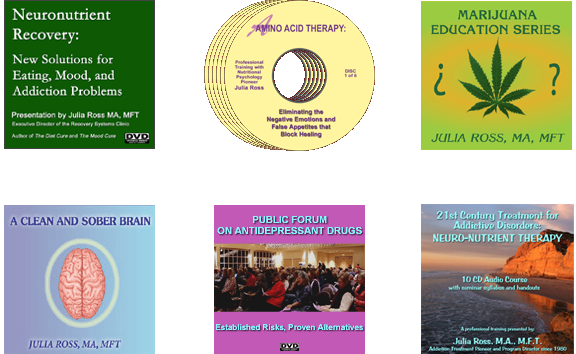NNTI’s goal is to train practitioners from the U.S. and abroad to nutritionally optimize the brain neurotransmitters that regulate our appetite, mood, energy, and sleep through the therapeutic use of targeted amino acids and dietary rehabilitation. Our methods? Virtual education and a highly individualized Skype case review process. By mastering the tailored use of amino acids, co-nutrients, and dietary therapy our trainees quickly begin to see benefits that impact a wide range of problems. Early on, they typically report amazing successes. For example, they’ve eliminated depression in post-stroke patients; relieved severe diabetes, panic disorder in teenage girls, sleep disorders of all kinds, deep grief, PTSD, and addiction to food, alcohol, or drugs, for which there is so little other hope.
To help them accomplish this, we also address the following and other associated issues:
- The need for effective alternatives to antidepressant medications
- Adrenal dysfunction
- Pyroluria
- Thyroid dysfunction
- Sub-Clinical Bipolar spectrum issues
Qualifications
- Licensed or certified health practitioners from a variety of specialties are welcome to apply for admission to the Neuro-Nutrient Therapy Institute (NNTI).
- They must already be in practice and able to implement the NNTI strategies into existing casework.
- They will need to have had specific education in the basics of diet and nutrition or be able to take the NNTI Food Fundamentals course before or during their advanced training process (see below)
- They will need to be able to follow and document at least 20 cases and write up and submit progress notes and forms on eight that have been followed for at least a 12-week period.
How to Apply
- Email a letter describing your background and interest in this advanced training process along with your C.V. to NNTI at info@cravingcure.com.
- You will be contacted and, if your application is accepted, an admission’s interview will be set up by phone or Skype. The admission’s interview fee is $125/hour.
Training Elements
I. CD’s or DVD’s and recorded seminars on advanced topics
II. Assigned readings
III. Individual case consultation by phone, Zoom, or email 1-2 times per month
IV. Group meetings for support, education, and case discussion (number varies)
V. Eight case write-ups reviewed with Julia Ross.
Foundations of Amino Acid Therapy
CD review, reading, individual case consultations by phone or Zoom (scheduled 1-2 times per month) and group meetings for support, education, and case discussion (number varies) provide the following instruction:
Addressing Deficits of Serotonin, Our Inner Sun and Moon:
- Adult and child assessment and dosing of precursor amino acids
- Implementing alternatives to anti‐depressant drug use: trialing and tapering
- Addressing Pyroluria
- The relation of serotonin to melatonin: Treating Type I Insomnia
- Treating serotonin‐deficiency addictions e.g. to refined carbohydrates, alcohol, and cannabis
Addressing Deficits in the Catecholamines, our Natural Stimulants (Dopamine, Norepinephine, and Epinephrine):
- Assessment and dosing with amino acid precursors and other nutrients
- Treating addictions to stimulants (e.g. chocolate, caffeine, meth, Ritalin, cocaine)
Thyroid and adrenal function and other energy-generating functions and how they are linked to catecholamine deficits.
Addressing deficits in GABA, our Natural Tranquilizer:
- Assessment and dosing with GABA and GABA supportive aminos for overstress and Type 2 Insomnia
- Testing for and treating Adrenal Cortisol Dysfunction
- Addressing tranquilizer addictions (e.g. to benzos, pot, or tobacco)
Addressing the Depletion of Endorphin, our brain’s pleasure and comfort provider and pain killer:
- Dosing with DLPA, DPA, and other amino acids for emotional and physical pain intolerance
- Treating addiction to endorphin‐stimulating substances and behaviors (e.g., to chocolate and other comfort foods, opiates and other pain killers, over exercise, and other behaviors)
The Role of Diet in Neurotransmitter and Blood Sugar Optimization:
- Acquiring and assessing diet records
- Issues re: animal protein, saturated fat, and adequate calories
- Blood sugar regulating foods, amino acids, and other nutrients
- Eliminating all cravings for the new sugars, gluten, casein, and other addictive food substances
Note: If an applicant has no formal training in nutrition we provide the Food Fundamentals course (described below).
Individual Case Supervision
While initial readings and CD/DVD sets are reviewed, individual (and, sometimes, group) Zoom meetings introduce trainees to the client assessment and monitoring forms, the client assessment process, and a personal assessment and amino trialing experience. The personal sessions, exclusively devoted to trainees’ own emotional, physical, and dietary health, instruct from the inside out, giving them the actual experience of the therapeutic process. As soon as possible, under continued Zoom supervision, trainees begin trialing the aminos with family and friends, and then begin treating clients.
Trainees will meet individually twice per month (or more often, as needed depending on their case load) to review case progress and expand their expertise. Each participant will need to prepare at least two cases to discuss each month, by emailing intake forms, follow-up Amino Acid Therapy Charts, and any additional material needed, ahead of time.
Certification Process
After 20 cases have been treated with the aminos and eight written up, thoroughly documented, and reviewed with Julia Ross, she will award certification or make specific assignments to help the trainee develop any skills or experience still lacking.
Special Emphasis Certifications
If candidates for certification would like to develop a specialty such as the treatment of depression, anxiety, eating disorders, or chemical dependency, adjustments to the curriculum may be made and additional assignments and consultation offered.
Post-Certification Benefits
A list of Certified Practitioners are posted on the Julia Ross’ Cures website and at the Virtual Clinic’s intake desk. They may become NNTI mentors or instructors and be recommended to media and promoted in other ways by Julia Ross.
Recertification Requirements : Continued Growth Opportunity
- For the first two years, two new cases will be presented annually and discussed with Julia Ross or other Institute instructors whose suggestions (if any) must be followed and implementation documented in order for a practitioner to retain certification and referral status the following year. Our trainees universally find these sessions clinically invaluable.
- After three years, case write-up submissions will be required at the discretion of the Institute instructors only.
- Attendance at occasional continuing education seminars (phone or zoom) may also be required.
Program Costs
NNTI TRAINING TUITION
- Advanced Amino Acid Therapy Training, 12 months.
Tuition: $4,500.00 paid in advance or in monthly installments.
- The Food Fundamentals Course, 10 weeks.
The cost of seminars plus homework/assignment reviews: $1,125.00.
- Re-certification Costs:
1) 1-2 hour(s) annual case review $100 – 200 (for two years, or, as needed).
2) Any required continuing education seminars, $50 – 150 each.
What kind of practice do I need?
What is the overall time commitment?
We encourage trainees to complete their certification process within a year. Initially, trainees will need to spend time listening to two CD sets, viewing a two-hour DVD, and reading Julia’s three books. They will then need to begin practicing amino acid therapy with a minimum of 20 clients and scheduling six to twelve, monthly individual case support sessions (via phone or Zoom) with their instructor (1-2 hrs. each). Eight of their cases will be formally written-up and presented. The time needed to prepare these eight cases for review depends on each student’s unique pace and their caseload. (To certify in 12 months, two cases should be delivered and presented to the instructor every 12 weeks.) Group (Zoom) meetings last 2-3 hours each. Our Fall 2018 accelerated curriculum will include eight weekly foundational group sessions (total 16 hours) followed by twice monthly Zoom sessions which will focus on case discussion and advanced topics (16 hours). Homework assignments may follow any group or individual session.

